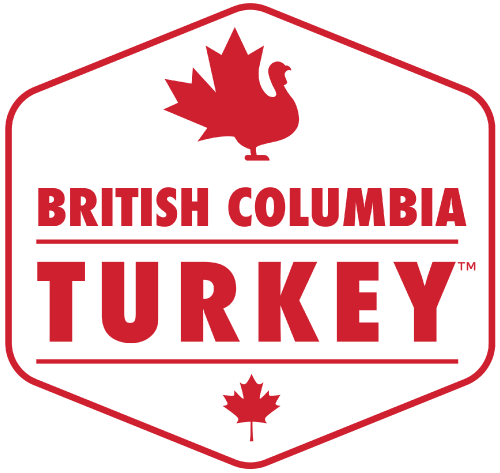BC Turkeys are Raised with the Highest Standards of Care
There are 62 registered turkey farmers across British Columbia, and a number of hatcheries, processors, and poult brokers, too. They all work 365 days of the year to provide quality, healthy, and nutritious turkey products for our province, especially around the busy holiday seasons.
But what exactly goes into raising these birds, and how does BC Turkey ensure each farm produces ethical and sustainable products? We’re so glad you asked!
BC Turkey Farmers all follow the Flock Care Program®
All turkey farmers in Canada follow the Flock Care Program®, including our farmers in British Columbia. It’s a national program that requires detailed on-farm record-keeping so that consumers can trust all of the birds are properly handled with care. This includes detailed steps of biosecurity procedures and documentation so that every farm meets Canadian regulatory requirements.
BC Turkey audits every registered farmer on a regular basis to ensure standards are upheld and met at every stage.
One of our registered farmers, Debbie Etsell, assured us that providing safe food for Canadians is one of their top joys. Everyday involves paperwork to record their procedures and the ongoing care of their birds.
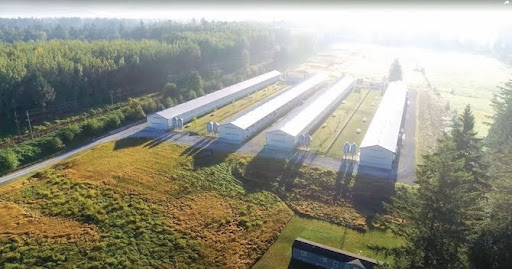
Barns are vital for turkeys
But it really begins with the barns—specially designated buildings that provide protection from predators like coyotes, bio-security safeguards for diseases, and structures that give the birds a safe haven from bad weather. All the barns are temperature monitored to keep the turkeys warm, dry, with plenty of sunlight and access to good food and fresh water. No cages—just plenty of room for them to free-roam and bed down on floors covered with soft materials.
“We care for our turkeys with loving hands,” one of our registered farmers, Alf Wall from McDermott Farms, recently told us.
“We treat our birds with great respect,” Wall said. “I mean it’s our livelihood, so if they get sick, it’s a real problem. So we try to keep them healthy, and give them the best environment that we possibly can. That’s why we spent 6 million on our two new barns.” Canadian Poultry Magazine even ran a piece on their impressive new facility after the catastrophic 2021 Fraser Valley flood ruined their previous operations.
Now, their barn has even better control on air intake, heating and lighting, and includes alarms for temperatures and feed. For example, every two hours a feed line should run—if there’s an issue, it’ll alert Art Wall and his team. But workers still go inside at least three times a day, regardless.
“There’s lots of checks and balances that way,” Wall explained.
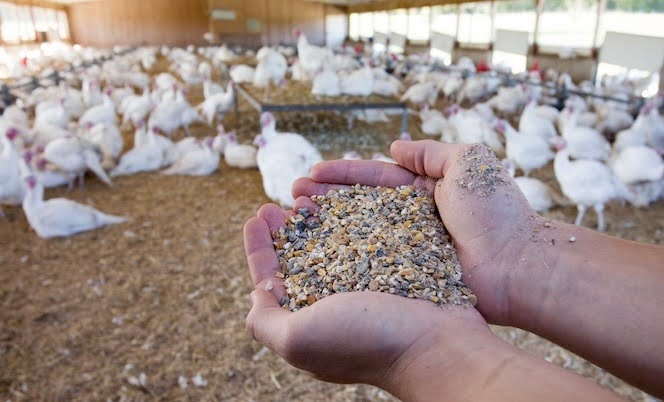
Turkeys get breakfast first
A typical day on the farm, according to Jason Froese from JD Farms, begins with chores at around 7am. As the second generation to farm turkeys, his parents instilled in him a golden rule: before the farmers get fed, the birds get fed and checked on. Only then can he have his breakfast.
Jason and his farmers will walk through each barn first thing in the morning, making adjustments to the water and feed lines, giving the top dressing more sawdust, and ensuring the turkeys have a cozy start to their day.
They’ll come in a couple more times and then later in the evening, they’ll do a final walk-through before leaving them for the night. The next day, they’ll do it all over again.
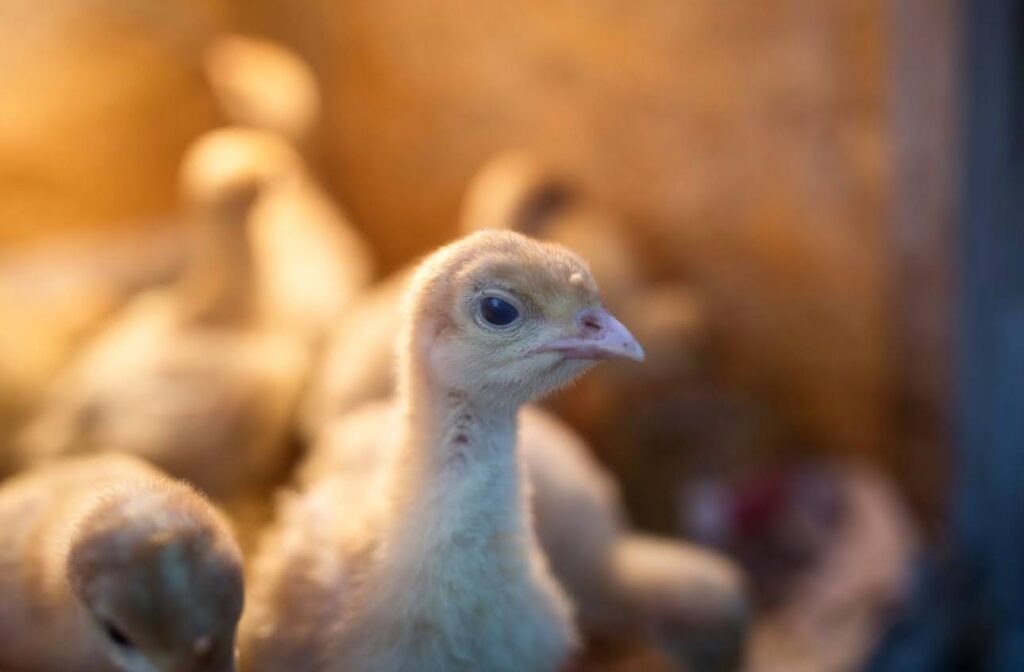
Day-old turkeys are called “Poults”
When a turkey is born, they’re referred to as “poults.” Placed in the climate-controlled barns, the poults are kept warm and provided special care as soon as they arrive from the hatchery. The first stage of their life is called brooding—from the moment they’re born to five-to-six weeks old—before they enter the next stage, known as the “growing cycle.”
Anywhere between eleven and seventeen weeks of age, turkeys are weighed and measured until they reach the specific market desired weight. Female turkeys, often called a “hen,” are typically grown for the whole bird market, while the male turkey, named a “tom,” goes for further processing to provide turkey wings, ground products, and other food items you find at the grocery store.
Since the environment is critical for turkeys—poultry are highly susceptible to respiratory diseases—the barns ensure optimal experiences and conditions as they grow. The result, according to Art Wall, is really enjoyable for humans and the birds alike; whenever he visits his barn, a stampede of turkeys run towards him, happy and healthy.
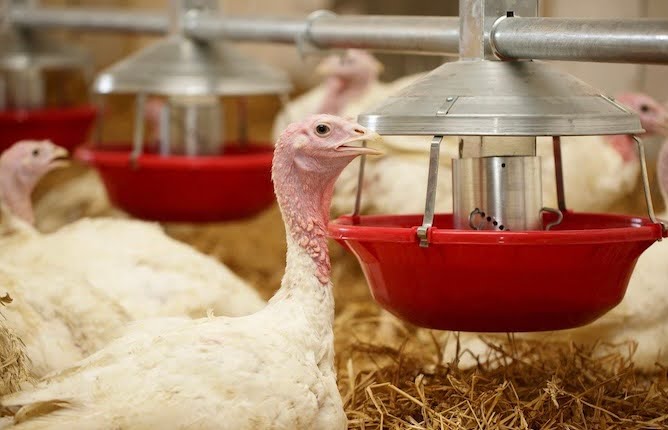
What turkeys eat
For the most part turkeys are omnivores and live off a feed formulation composed of mixed grains, oilseeds, and a small percentage of animal protein. Their diet usually consists of corn, soya, wheat, barley, and canola. The most important thing is that they receive the proper nutrients for healthy growth and development.
However, different farmers follow a different diet recipe.
JD Farms raises specialty birds that receive a natural diet of grain, vitamins, and minerals without any antibiotics or other animal by-products. Jason Froese recently told us that the vegetarian feed means the birds have a different taste and flavour, and because they’re a slower growing turkey, it can help add more tenderness to the meat.
JD Farms ensures the feed mills they work with are top notch since a big part of a turkey’s growth relies on feed quality. “Feed procurement is a big thing,” Froese explained.

BC Turkeys are products you can trust
When you get to work with the farmers like we do, you instinctively trust the food on your table. Every registered turkey farmer in our province follows Canada’s national program, ensuring ethical and sustainable practices go into every stage of farming. They greatly respect and care for their birds, spending hours each day ensuring optimal conditions so that the barns are kept dry, cozy, and warm.
When you see a BC Turkey logo, or one of our registered farmers and processors, you know that the product is held to the highest standards.
This holiday season, you can rest assured that the turkey on your table is healthy, delicious, and locally-sourced. Supporting the BC farming industry means you support the farmers, their families, communities across the province, and your own health and safety.
So #ThinkTurkey this winter and enjoy #EverydayTurkeyMeals from BC Turkey and our farmers.
